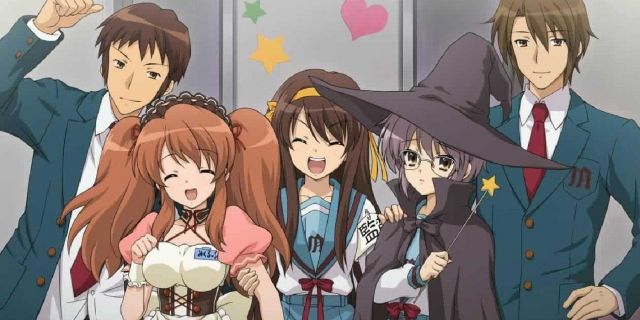For hardcore anime fans in the late 2000s, one dance craze-based series was incredibly hard to miss. The Haruhi Suzumiya franchise was catapulted into popularity by its anime, which itself became ever more popular when it was re-released with more episodes. As with anything popular, this mainstream success led to a legion of fans and just as many haters.
Much like with other somewhat comedic anime of the time, Haruhi Suzumiya helped to cement tropes that are now increasingly commonplace. It did so with its cast, and especially its main protagonist who is now criticized for a variety of flaws. Nevertheless, the series is still a modern classic to many, with the years only furthering its popularity and renown.
Memorable Characters and a Great Ending Theme Made Haruhi Suzumiya a Classic

The cast of Haruhi Suzumiya are all popular in their own way thanks to how their personalities clash and complement each other. Haruhi herself is the very definition of over-the-top, doing whatever she wants with little regard for how others view her. Intent on encountering all manner of supernatural beings, she forms the “S.O.S. Brigade” club and inadvertently fulfills her mission. Kyon is the opposite of her, as his personality is much more blasé to the surrounding weirdness. Mikuru is a sweet and bubbly girl who outright fears Haruhi, whereas Nagato is almost inhumanly emotionless. Each of these characters bounces off the others during the series’ uproarious events, most of which are caused by Haruhi’s increasingly ridiculous antics.
Perhaps the biggest highlight was the anime’s music, however. In particular, the series’ first ending theme — “Hare Hare Yukai,” or “Sunny Sunny Happiness” — was a bubblegum pop song that had an accompanying dance animated into the show’s closing sequence. Said choreography inspired countless remakes and remixes by fans, with the now iconic ditty being the stuff of 2000s-era memes. The characters all also had image songs that coincided with their personalities, such as Mikuru’s adorably Latin-influenced “Mitsukete Happy Life.” Nonetheless, for all these great elements, there are many who have found fault with Haruhi Suzumiya, and some of these complaints might not be unfounded.
Haruhi Suzumiya’s Memes and Music Overshadowed the Show’s Real Faults

One big criticism of Haruhi Suzumiya is that the characters, as beloved and iconic as they’ve become, are a bit less than developed or even likable. Haruhi in particular is now looked back upon in a somewhat toxic light, as her abrasive and misanthropic behavior takes no one else into consideration. This could arguably make her a tsundere like Taiga Aisaka from Toradora!, but even the Palmtop Tiger was nice to some people. It’s why the character is still so debated to this day, with some “fans” going quite far to display their hatred of her. Kyon just goes along with this antisocial behavior, even cracking jokes about how off-the-wall Haruhi can get. When combined with his general lack of a strong personality of his own, it definitely makes him complicit in a way.
Likewise, the other characters lack firm development, being there more for now-trite tropes or other purposes. For instance, Mikuru’s actions essentially revolve around sex appeal and “cute girls doing cute things,” with the former making Haruhi into something of an abuser. Nagato completely lacks much personality or agency, and overall, the series is simply about a group of characters going along with whatever inane plot Haruhi has schemed up in that particular episode. It’s only because each character is so charming in their own way that this is overlooked by the series’ fans.
The music factor also can’t be ignored when it comes to Haruhi Suzumiya’s reception, with the memes and dances only further hyping the series up. Thus, viewers felt that they simply had to like it, especially when it involved such catchy tunes. These songs are a big part of why the series is still remembered so much, but denying the entertainment factor of the series as a whole would be disingenuous. Haruhi Suzumiya is still very much a classic, even if it’s one framed within a specific “moment” in anime fandom. While other anime have since been created that do similar things even better, Haruhi Suzumiya will likely remain a well-regarded show for an entire generation of otaku.















Leave a Reply